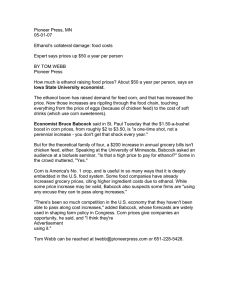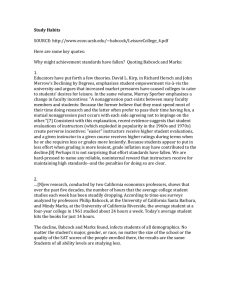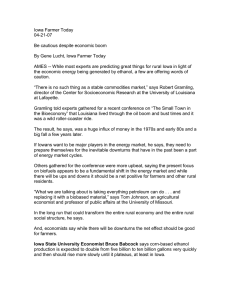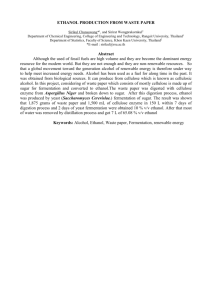Fort Dodge Messenger, IA 05-24-07 Experts foresee rise in goods, services
advertisement
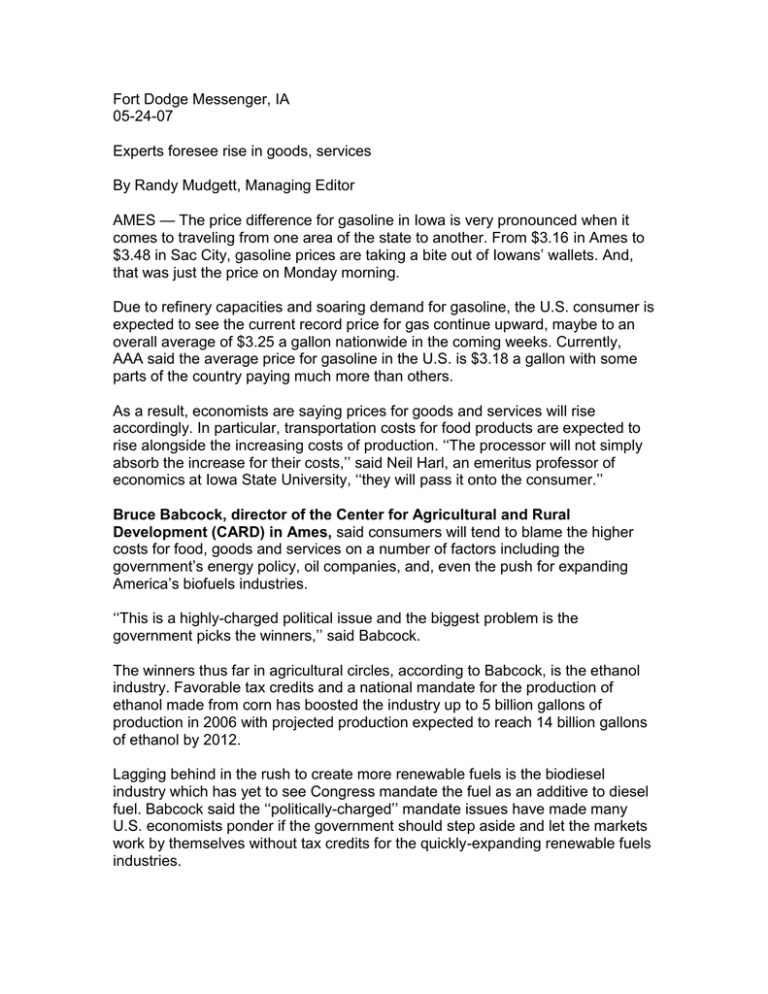
Fort Dodge Messenger, IA 05-24-07 Experts foresee rise in goods, services By Randy Mudgett, Managing Editor AMES — The price difference for gasoline in Iowa is very pronounced when it comes to traveling from one area of the state to another. From $3.16 in Ames to $3.48 in Sac City, gasoline prices are taking a bite out of Iowans’ wallets. And, that was just the price on Monday morning. Due to refinery capacities and soaring demand for gasoline, the U.S. consumer is expected to see the current record price for gas continue upward, maybe to an overall average of $3.25 a gallon nationwide in the coming weeks. Currently, AAA said the average price for gasoline in the U.S. is $3.18 a gallon with some parts of the country paying much more than others. As a result, economists are saying prices for goods and services will rise accordingly. In particular, transportation costs for food products are expected to rise alongside the increasing costs of production. ‘‘The processor will not simply absorb the increase for their costs,’’ said Neil Harl, an emeritus professor of economics at Iowa State University, ‘‘they will pass it onto the consumer.’’ Bruce Babcock, director of the Center for Agricultural and Rural Development (CARD) in Ames, said consumers will tend to blame the higher costs for food, goods and services on a number of factors including the government’s energy policy, oil companies, and, even the push for expanding America’s biofuels industries. ‘‘This is a highly-charged political issue and the biggest problem is the government picks the winners,’’ said Babcock. The winners thus far in agricultural circles, according to Babcock, is the ethanol industry. Favorable tax credits and a national mandate for the production of ethanol made from corn has boosted the industry up to 5 billion gallons of production in 2006 with projected production expected to reach 14 billion gallons of ethanol by 2012. Lagging behind in the rush to create more renewable fuels is the biodiesel industry which has yet to see Congress mandate the fuel as an additive to diesel fuel. Babcock said the ‘‘politically-charged’’ mandate issues have made many U.S. economists ponder if the government should step aside and let the markets work by themselves without tax credits for the quickly-expanding renewable fuels industries. In a recent edition of CARD’s ‘‘Iowa Ag Review’’ newsletter, Babcock wrote about U.S. energy policy and how that it should not choose sides when it comes to promoting the expansion of renewable energy. ‘‘Future policies will eventually be more neutral if the United States becomes serious about increasing energy security and lowering greenhouse gas emissions,’’ he wrote. A more just policy, according to Babcock, would be similar to current policy that is in place in Europe where emission credits either tax you for emitting excess greenhouse gases or reward you for reducing emissions. Babcock told Farm News Monday one of the major problems with current U.S. energy policy is it does not take into account for the efficiencies of renewable energy in its many forms. ‘‘Right now everyone wants more tax credits to offset the costs of renewable energy without crediting each form based on how well it works,’’ Babcock said. For example, an ethanol plant would be more efficient if a cattle feeding operation was located nearby and the manure produced by the animals was used to power the ethanol plant. ‘‘Right now, manure cannot participate as there are no incentives to produce methane from manure. Likewise for other future renewable sources of energy.’’ Currently ethanol receives a 51-cent-per-gallon blenders credit while biodiesel garners a $1-per-gallon credit. ‘‘The irony of all of this is ethanol drives up corn prices which chokes off profits for ethanol,’’ said Harl. ‘‘It really is corn versus oil and technology will drive the biofuels industry or new technology will replace it.’’ Harl said economists are advising those who are involved in renewable fuels to ‘‘enjoy the ride’’ but ‘‘don’t spend it all now’’ as many people can remember the stages agriculture follows. ‘‘If ethanol and biodiesel is not the solution to America’s energy problems, an adjustment could take place that could be a painful retrenchment.’’
